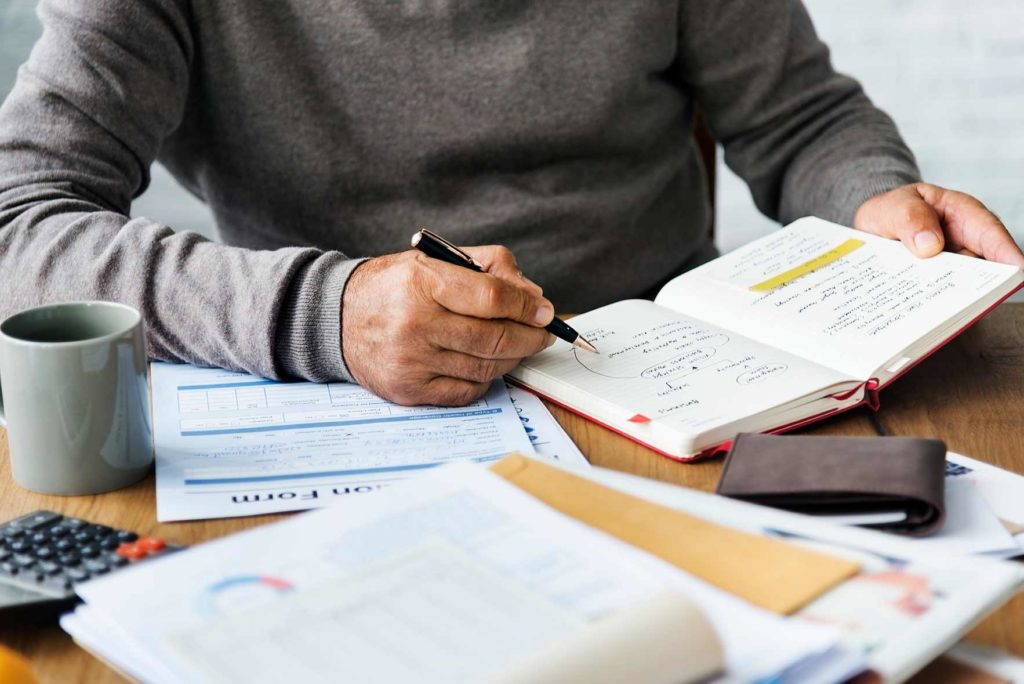April 15, 2020
How to Secure your Financial Future Amid Covid-19: Interviews with the Experts

In a matter of weeks, life has been turned upside down for all. Priorities have shifted, social distancing has been put in place and no one knows how long we will be living in this limbo. We understand that you might be unemployed, scared of losing your job or in crisis mode keeping a company afloat and we wanted to do what we could to provide some comfort and a sense of control during these challenging times.
As you may have heard, we are launching a personal finance content site (powered by PartnerCentric) called Finsplaining in the coming months.
We are working hard to make sure that the content is relatable, timely and approached with a “no-bs” filter. With that said, we wanted to provide a sneak peek here so it reaches a larger audience of folks who need the information now.
Interview with Miranda Marquit
In this interview series, we talked to money experts to get their thoughts around finance management during Covid-19. Our first interview is with Miranda Marquit. Miranda is a finance content writer and has been covering financial subjects for nearly 15 years. She’s contributed to NPR, Forbes, U.S. News & World Report and worked with a number of companies. Miranda lives in Idaho with her teenage son and these views are her own.
AC: Miranda, thank you for taking this interview. Hope you are staying safe and indoors! How has Covid-19 impacted your life these past few weeks?
MM: For the most part, I haven’t seen a lot of big changes. I’m fortunate that I’ve been able to work from home for 15 years.
However, it is a bit challenging, as I was used to a social gathering once a week, and that’s gone. We’ve taken some of our social activities online, which is fun, but not exactly the same. Some of my clients have pared back the work they need me to do, but so far it hasn’t had a huge impact on my income. Unfortunately, not everyone is in this position.
Navigating unemployment
AC: What would you tell someone who is scared of losing their job to do right now? Are there steps they can take now to mitigate the fall-out? And what would you say to someone who has already lost their job? What should they be doing right now?
MM: Start by applying for unemployment. I understand that can be challenging right now as state unemployment offices are under immense strain. However, if you have lost your job, now is the time to start the process. If you’re concerned about losing your job in the coming weeks, consider putting together an emergency budget. Look at the items you can cut out right now, and position yourself to begin reducing expenses.

Also, review the resources offered by your state. Some states are staving off evictions for those who can’t pay rent. Some lenders are allowing you to skip payments. Realize, though, that these measures are likely to have strings attached, such as still accruing interest and adding payments to the end of your term. However, if you need to take these emergency measures to free up cash flow, it can make sense.
If needed, consider putting retirement account contributions on pause and keeping that cash accessible. You can also halt federal student loan payments without accruing interest. If you’re worried you’ll lose your job, take advantage of this to bank that money instead of putting toward student loans. Use it to pad out an emergency fund. If you end up not losing your job, make a big student loan payment with the money just before interest starts accruing again.
Finally, find out what resources are available in your community. Food banks, help with utilities and other types of assistance are usually available. Find out what’s there, especially if you’ve already lost your job. These safety net programs can help you extend your emergency fund and reduce the amount of debt you end up with.
Economic expectations
AC: The stock market has been in constant flux since this pandemic started. What are your predictions for the economy?
MM: No one can predict what’s next. However, I think that there’s the potential for an economic reckoning weeks or months down the road. Because we don’t have widespread testing and tracing, we don’t know what the spread is, and we likely won’t know when we’ve actually hit the true peak until it’s passed. What remains to be seen is whether small “Main Street” businesses can hire folks again in a little while, as well as the impact of millions of people losing their employer-connected health insurance.
AC: Trump recently signed the $2 Trillion Covid-19 Relief bill into law. What do you think the ramifications of this will be? Do you think it’s enough? What more should be done?
MM: The bulk of the money is being used primarily to prop up the businesses connected to the stock market. The University of Chicago has some great past research that indicates that tax cuts are most effective when they put money into the hands of those with middle and lower incomes.
The CARES Act doesn’t put the bulk of the money into ordinary folks. Implementation of things like the Paycheck Protection Program and enhanced unemployment benefits has been patchwork, with few people getting what they need when they need it. Because the bulk of the funds go to big businesses who likely need it least, and without any meaningful oversight, my biggest worry is that ordinary folks who would actually spend money in the economy aren’t getting what they need. Look what happened after the 2017 tax cut.
Most of the companies who benefitted used the money on stock buybacks, pumping up their stock prices and supporting the stock market, but very little actually benefited employees who actually spend money in their local economies. And companies like United are already announcing coming layoffs in September — even though they are getting their share of billions.
Purchasing a home
AC: My brother had just started the process of buying his first home before all of this hit. When would it make the most sense for him to restart the process? What should he consider if and when he does?
MM: Buying a home is always about your personal lifestyle and financial goals. Any attempt to time the market could blow up in your face. If he’s in the middle of getting the home he wants, and he will still be able to accomplish his lifestyle and financial goals, starting again might not be the best move.
However, if he’s not too far in, hasn’t settled on a house and he’s willing to take the risk of missing his window in favor of waiting to see if prices and mortgage rates drop in a few months, that’s not a terrible idea. He might save some money.
It’s worth noting, though, that in previous recessions, home prices didn’t fall as dramatically as they did in the runup and aftermath of the 2008 financial crisis. While they fell in a recession, the financial crisis was a different story because the trigger was the housing market. This recession isn’t triggered by the housing market, so the price drops might not be as spectacular. But you never really know.
The important thing is to be clear about your own goals and needs, and make decisions on your strategy and not the whims of any market.
401K Advice
AC: I was told that we shouldn’t be obsessively checking our 401Ks during this time. Why is that and what can we do to be proactive?
MM: In the short-term, the market is volatile. If you look at a trend line in the long term, though, it smooths out and heads higher. You only end up with losses if you lock them in by selling during a downturn. If the stock market completely tanks and never recovers, we have bigger problems.
Because we’re in the middle of volatility, there’s not a lot that can be done immediately. But one thing to do in the future is to use a bucket-type strategy for your money.
In this strategy, money you think you’ll need in the short term is kept in cash.
For example, just before the beginning of 2020, I was a little nervous about the markets, and economic fundamentals. I knew my son would be starting college in 2021, but I didn’t know when a crash would come. I didn’t want to be trying to pull money out of his 529 in the middle of a down turn. So I sold high-performing assets in the amount I need for three semesters of school and put them in safer assets. Most of his 529 is still in stocks, and will benefit from a recovery. But the money he’ll need next year for school is safe.
Adopting a strategy that allows you to be somewhat flexible ahead of time can allow you to ride these events out. However, it’s important not to change your strategy in the middle of major events like this in response to feelings of panic.
What to do right now
AC: What are your three biggest tips for us to follow right now, regardless of financial standing?
MM: They are:
- Know what resources are available to you. Find out what you have in terms of income, potential side income and safety net programs.
- Prioritize your expenses. Know which things must be paid in order for you to maintain safety and shelter, and which things can be cut out or skipped.
- Tweak your current plan if you have to temporarily, but try to stay on track with your goals. If you have to make emergency changes, plan how to get back on track later when this is all over.
Small businesses
AC: What can small businesses do right now to stay afloat?
MM: Take a look at programs like the Paycheck Protection Program. It’s hard to apply, and the rollout has been challenging, but take a look and see if you are eligible.
Also, look into expanded unemployment benefits. Some, like freelancers, have access to these. See if you qualify.
Look for ways to be creative and help in your town. One local business owner is garnering goodwill by continuing with her regular restaurant order, but selling the supplies to the public at her cost. Many people can’t find staples like flour, sugar, milk and eggs at the store, but she’s still getting her restaurant order. So it’s helping that others can get them from her. Additionally, make it easy for people to buy gift cards from you or order online. Get the word out that you can make these types of accommodations.

Emergency funds
AC: For the future (since not everyone can do this currently), how much should Americans have in an emergency fund?
MM: The general advice is to have three to six months worth of expenses saved in an emergency fund. This is a reasonable rule of thumb. However, I also think it makes sense to prepare for emergencies, if you can, by taking steps to do things like build at least a few weeks’ worth of food storage. If you have the space and can slowly build up by buying an extra bag of frozen vegetables or canned fruit, or some other non-perishables when you shop, that can also help in a situation like this, reducing your need to use emergency savings on these costs.
Have questions for Miranda or just want to chat? Please get in touch.